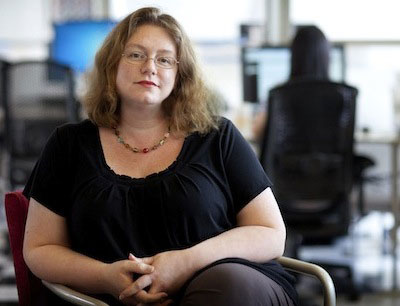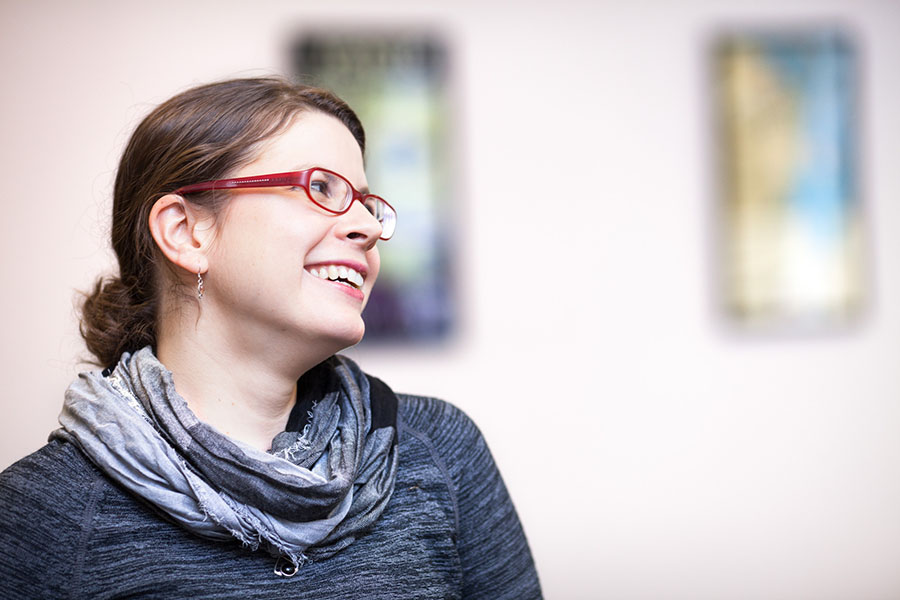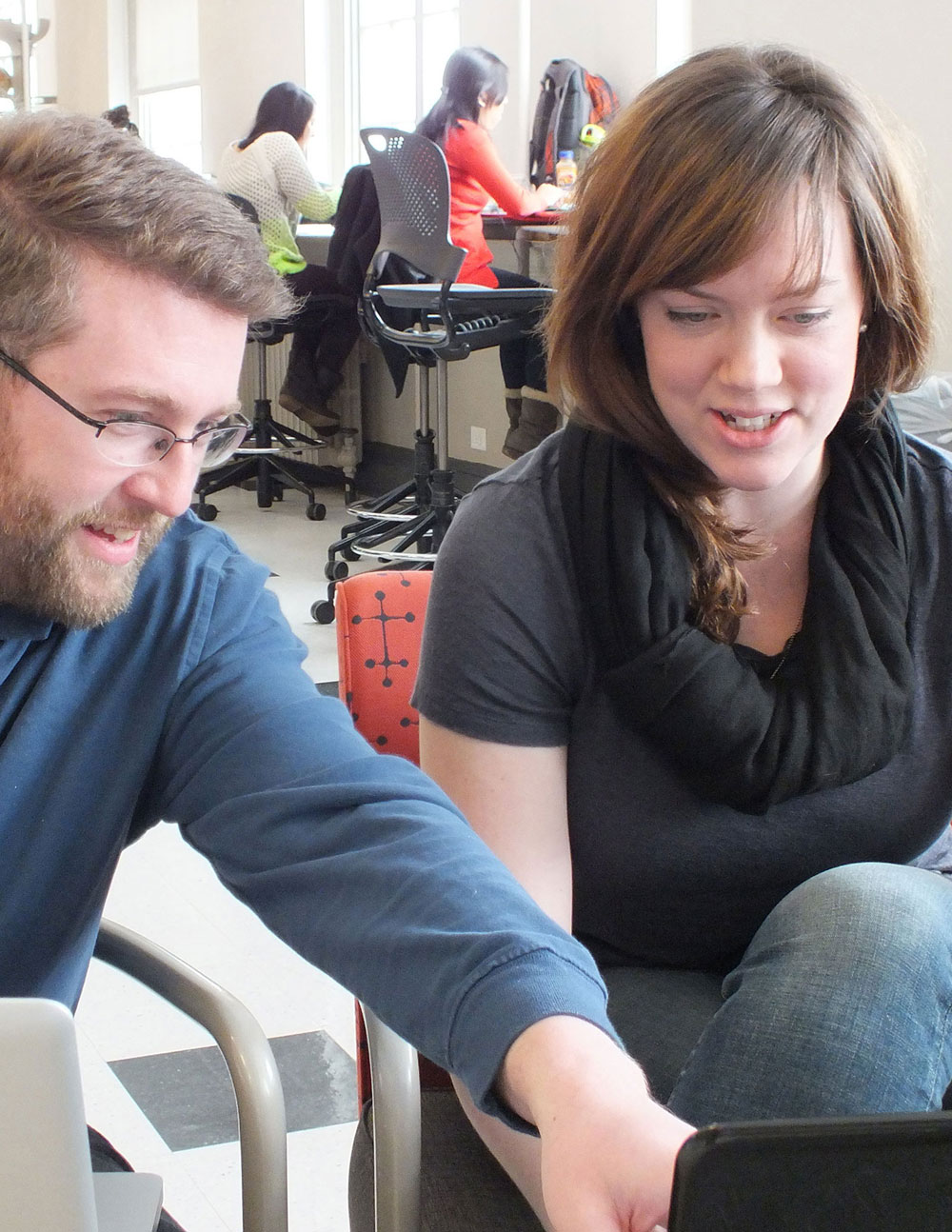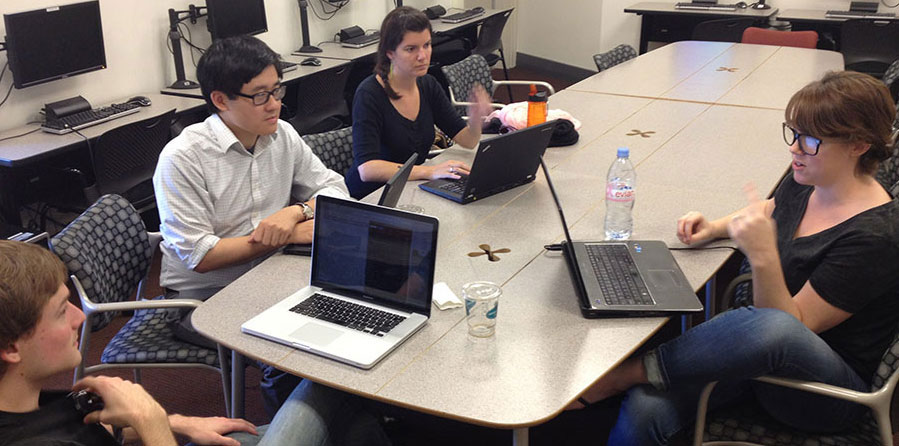UVa Praxis Program
Based in the Scholars’ Lab, a center for digital humanities R&D and expert consultation at the University of Virginia Library, the Praxis Program brings together a small cohort of graduate fellows from a variety of disciplines each year, to learn by working collaboratively on a single open-source tool for humanities research and teaching. For more information, read this Chronicle of Higher Education essay, contact the Head of Graduate Programs in the Scholars' Lab or visit the website.
Mission
To equip the next generation of knowledge workers for faculty positions and alternative academic careers at a moment when new questions can be asked and new systems built; additionally, to serve as the key node and nurturer of a broader "Praxis Network."
The Praxis Program is a year-long, team-based, funded fellowship at the University of Virginia Library, meant to foster emerging scholar-practitioners of the digital humanities. Its goal is to help Praxis fellows become as comfortable writing and deploying software, managing teams and budgets, and engaging in public humanities discourse as they are conducting original research and exchanging expert knowledge in their disciplines.
Begun in 2011 as a pilot program of the the Library's Scholars’ Lab, Praxis is a radical re-imagining of digital humanities center-based teaching, training, and research. It complements the Scholars' Lab's ongoing work with individual Graduate Fellows in Digital Humanities, a program begun at UVa Library in 2007—with the crucial difference that Praxis Program fellows work collaboratively on a single, shared project that could never be executed by one scholar alone. In eschewing the dominant humanities model of solitary production and publication, their work is a closer match to the practices and ethos of Scholars’ Lab R&D, the research-and-development team at the heart of the lab.
The Praxis Program was launched in the context of discussions hosted by the Scholarly Communication Institute, a ten-year Mellon-funded humanities think tank based in the Scholars’ Lab, which provides opportunities for leaders in academic disciplines, research libraries, advanced technologies, and higher education administration to develop innovative strategies to advance scholarly communication in the context of the ongoing digital revolution. Graduate education reform was a critical component of SCI's work, with a major goal being to explore and test new programs for the education of scholars and scholarly communication professionals.
UVa’s Praxis Program—like the Praxis Network itself—was one of several initiatives designed to help survey needs and opportunities, develop and articulate new models, and foster the growth of collaborative networks among organizations, institutions, and sectors of the academy with a stake in graduate and professional methodological training in the humanities. SCI partnered with the Consortium of Humanities Centers and Institutes (CHCI) and with centerNet, an international network of digital humanities centers, to develop additional pilot programs at other institutions. But Praxis will endure as a key component of the work of the Scholars’ Lab at the University of Virginia.
People
An annual cohort of six students from a variety of disciplines. Fellows receive mentoring and instruction from Brandon Walsh and Scholars’ Lab faculty and staff.
Praxis Fellows receive training and support from the Scholars’ Lab’s top-notch Research and Development team, which also provides the UVa community with consultation, programming support, and infrastructure for innovative work in the digital humanities and in place-based or geospatial research and scholarship across disciplines. This group is comprised of software developers and designers with deep, often doctoral-level training in the humanities. Primary technical instructors and mentors for the program include Wayne Graham (Head of Scholars' Lab R&D), Jeremy Boggs (Design Architect), and Eric Rochester (Senior Software Developer), but many other members of the Scholars' Lab team participate and contribute within their areas of expertise. The graduate fellows themselves represent a variety of humanities disciplines. While the program's first cohort (2011-12) included scholars of literature, textuality, and art history, its second (2012-13), third (2013-2014), and fourth (2014-2015) are far more intellectually diverse, including students with backgrounds in art history and architecture, history, music, sociology, computer science, literature, religious studies, and philosophy. They join the program at various stages of their academic careers, and with a range of technical backgrounds. Most, however, are digital humanities novices. As they work together over the course of a year to conceptualize, design, construct, and deploy a humanities software tool, they build on their existing strengths while also gaining new skills in areas that are more challenging for them.
The Praxis Program was conceived by Dr. Bethany Nowviskie, who also directs the department of Digital Research and Scholarship at UVa Library and is president of the Association for Computers and the Humanities (ACH).
Bethany Nowviskie

Purdom Lindblad
Purdom Lindblad joined the Scholars' Lab as Head of Graduate Programs in 2014. Lindblad holds an MA in American Studies from Michigan State University (where she worked at MATRIX, MSU’s digital humanities center and studied at Doshisha University in Kyoto as the winner of a Monbukagakusho scholarship) and an MSI from the University of Michigan, School of Information.

Brandon Walsh
Brandon Walsh joined the Scholars' Lab as Head of Graduate Programs in 2017. Prior to that, he was Visiting Assistant Professor of English and Mellon Digital Humanities Fellow in the Washington and Lee University Library. He received his PhD and MA from the Department of English at the University of Virginia, where he also held fellowships in the Scholars’ Lab.
The Praxis Program and Praxis Network stem from Nowviskie's interest in valorizing "alternative academic" careers and preparing committed scholars to contribute to the larger project of the humanities by taking on projects in scholarly communications, library and information technology, and the public sphere. Partnering faculty and staff share these goals, and try to model the contributions Praxis fellows might make as scholars forging non-traditional paths.
Structure
This one-year funded fellowship features weekly meetings, a single, collaborative project common to all fellows and staff, and iterative, public sharing of outcomes and teaching materials.
Following a competitive process for program admission (which includes group interviews), fellows participate in two hours of weekly meetings, and also commit to ten hours of Praxis-related work per week. A typical weekly meeting might include a workshop or tutorial on a specific topic, a session of collaborative coding and problem solving on software design or functionality, or high-level discussions that tease apart disciplinary assumptions and pedagogical or research goals. Between meetings, fellows can be found working in their dedicated grad lounge, where they may sketch website designs on a whiteboard, test out new ideas for the project, or work together to compose a conference proposal or presentation. Participants learn, and theorize, by building.
The first Praxis Program cohort prototyped Prism, a digital humanities tool for collective reading, or "crowdsourcing interpretation." The second cohort rethought, revised, and extended the Prism framework to include visualizations and additional user interface options.
The third cohort was tasked with reimaginng the Ivanhoe Game, a platform for playful, collaborative interpretation of documents and artifacts. Rather than build a hosted service, the cohort developed Ivanhoe as a WordPress theme that anyone can download and modify. Currently, the fourth Praxis Program team is continuing to refine and develop the Ivanhoe Game.


Praxis Fellows consult with members of the R&D team in the Scholars’ Lab’s sunny community work space.
Each year, Praxis fellows draft a charter with guiding principles for shared goals and assumptions, attribution of credit, resolution of any potential conflict, and more. As the year goes on, they differentiate into project managers, coders, designers, content providers—the same kinds of roles that emerge in any real-world digital humanities development team. As a result, not only are they learning specific technical skills and building a public project, they're also gaining crucial understanding of work environments and related, "softer" skills of collaboration and negotiation, both sometimes difficult to acquire in academic humanities departments.
Throughout the process, fellows and R&D staff write blog posts documenting their learning process, successes, and failures. Learning in public is a fundamental aspect of the Praxis Program, and one that can be highly challenging for humanities students accustomed to working privately and sharing only polished work. As students become more comfortable sharing their progress and missteps, they set a valuable example to the humanities community. Their work both parallels and interrogates an increasing emphasis on open-source and open-access knowledge products and models.
Research
The first and second cohort prototyped and expanded Prism, a digital humanities tool for collective reading, or "crowdsourcing interpretation." The third cohort developed Ivanhoe, a platform for critical, reflective interpretation. The current, fourth, cohort is expanding and revising Ivanhoe.
Beyond the collaborative work of Prism, Praxis Fellows also produce innovative and rigorous individual projects. For models, they look to the staff of the Scholars’ Lab, all of whom are granted 20% of each work week for their own, independent research and development activities. This dedicated "research time" (a pioneering contribution of the Scholars' Lab, now increasingly common among digital humanities centers) ensures that staff advance in their own scholarship and maintain a portfolio of new and engaging work. Because self-directed research fosters creative thinking and experimentation, work that begins as individual projects often grows and evolves into larger-scale collaborative efforts involving the entire Scholars’ Lab team. (Examples of this include Project Blacklight, internationally-adopted open source library software that originated in the Scholars' Lab, and Neatline, a Scholars’ Lab tool for creating interlinked, interpretive timelines and maps.)

Year Two fellows Brandon Walsh (English), Shane Lin (History), Claire Warwick (Sociology), and Gwen Nally (Philosophy) discuss possible features to add to Prism.
The Scholars' Lab invites you to follow the work of our fellows and staff—always in progress—as we explore together what it takes to produce thoughtful digital humanities scholars capable of owning their own infrastructure: scholars who can design effective and interpretive user experiences, write and work with open source software, engage broad audiences, manage teams and budgets, and theorize their work within the rich tradition of humanities computing.
Support
Initially supported through a two-year pilot period by the Andrew W. Mellon Foundation, the program is now sustained by the University of Virginia Library, which also houses the Scholars’ Lab.
The Praxis Program was initially supported by the Mellon Foundation as a two-year, grant-funded pilot project, and has been sustained internally by the University of Virginia Library and local partners. This program is one piece of a much larger ecosystem of digital initiatives at the University of Virginia, and has quickly become an integral and valuable part of the contribution that the Scholars’ Lab is making to the humanities—not only because of the interpretive tools its fellows may develop, but because of the broad, forward-looking conversations it opens up and the model for innovative, extra-curricular methodological training that the Praxis Program provides.
Directions
The curriculum will be adjusted continually, based on participant interest and the potential of various projects to make meaningful interventions in contemporary digital humanities discourse—which is construed as including both DH theory and praxis.
This program is designed for a small, tightly-knit cohort that can learn to function as a team, so dramatically increasing the number of fellows would be counterproductive. Instead, measure of success will include: continued internal funding and financial sustainability; increased interest on the part of academic departments in providing similar experiences; a growing applicant pool of highly-qualified students; fellows from an ever-wider range of disciplines; and the successful continuation of past fellows through their graduate programs and into careers of their choosing. Already, fellows from the first cohort who finished their degrees have been hired into positions within and beyond the academy that excite them and build on skills they developed in the Scholars' Lab. Others, still in school, have joined local digital humanities projects where they can apply their new skills as qualified contributors, or continued on as Scholars' Lab Graduate Fellows, incorporating digital methods and research questions into their dissertations. All participants credit the Praxis Program as having a significant positive effect on their employment opportunities and decisions.
Longer term, the Scholars’ Lab team hopes that the methodological approaches that make the Praxis Program unique today—an emphasis on collaborative learning and building, learning “in the open” and communicating humanities research to broad audiences, and on project-driven pedagogy at the graduate level—will become far more common across the landscape of humanities higher education.
Nuts & Bolts
Keys for success include an investment of significant staff time for high-quality mentorship, adequate space for collaborative work, and flexibility to accommodate the various backgrounds and skill levels of the fellows.
If you’re considering implementing an initiative similar to the Praxis Program, there are a few things to consider:
- Often, the people most qualified to serve as instructors and mentors in a program like this are employed as humanities-trained "alternative academic" support staff, not as faculty. How can your prepare your institution to welcome and build on their expertise?
- While Praxis Program fellows do develop a public-facing digital project, the primary purpose of the fellowship is pedagogical and is a service to the students themselves, not to local projects directed by others. Fellows should not work on projects that are ongoing within the department or center, but rather be given the opportunity to devise their own digital research agendas.
- The time commitment this program requires is both substantial and varying, as students move from workshop-like learning opportunities to self-directed research and development. How much staff time can you divert from existing projects in order to provide fellows with the mentorship and guidance that they need? How much unpredictability can your teaching and support staff manage?
- The Scholars' Lab prefers to offer this opportunity as a paid fellowship, in order to offset the significant time students will devote to the project, and prevent them (as much as possible) from needing to take on extra outside work or teaching. A sustainable funding source is therefore essential, and local complexities of funding streams for graduate students must be taken into account.
- Will your fellows have adequate multipurpose space available where they can brainstorm and work collaboratively? Will they have access to this space on their own time, perhaps beyond the typical work day for office staff?
- The program is of perhaps most use to graduate students in early phases of their study, who can then apply its principles and their newfound skills to their dissertation research. These students, however, may still be taking courses and therefore have more trouble fitting group meetings into their schedules. How can you maximize time for students to work together?
- A good deal of flexibility is required in order to accommodate fellows from a variety of backgrounds and skill levels. How will you ensure that fellows take ownership of the process and project, while still providing sufficient direction so that they do not feel lost or overwhelmed?